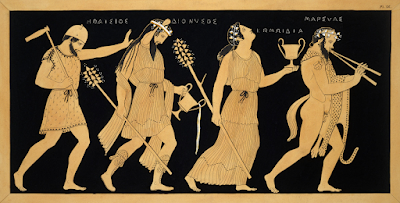The word "Myth" is derived from the Greek word "Mythos", which simply means "story". So, "Myth" refers to colorful stories that may be historical, though often supernatural, explaining the origins of a cultural practice or natural phenomenon. And "Mythology' is a collection of myths, especially one belonging to a particular religious or cultural tradition.
Greek mythology is a large collection of myths and teachings that belong to the ancient Greeks, concerning their gods and heroes, the beginning of the world, and the origins and significance of their own culture and ritual practices. It was a part of the religion in ancient Greece.
The Ancient Greeks believed that in the beginning, the world was in a state of nothingness, which they called chaos. Suddenly, from light, came Gaia (mother earth) and Uranus (the sky). Gaia and Uranus had 6 sets of twins. The most important of the 12 children were Kronos and Rhea.
Gaia gave birth to some monsters called Cyclops. Uranus disliked the Cyclopes, so he forced Gaia to keep them in her womb. Gaia angered by the amount of pain that Uranus had put her through by holding babies in her womb, sought revenge on Uranus. Gaia used her son Kronos, who chopped off Uranus' genitals. Kronos threw Uranus into the ocean.
From the blood of his genitals, came the goddess of love and beauty-Aphrodite.
Kronos married his sister Rhea and gave birth to 6 children, who were called the gods. Kronos, who was afraid of a prophecy delivered to him a while ago, swallowed each of his children each time they were born. Rhea did not like this, so she saved Zeus and gave Krenos a rock to eat instead. Zeus was raised by a centaur named Chiron, who is also the son of Kronos, in a mountain cave. When Zeus was old enough, he tricked Kronos into drinking a mixture of wine and mustard. Kronos vomited up the rest of the gods, who, being immortal had been growing up completely undigested in Kronos' stomach. Zeus then banished Kronos to Tartarus.
Zeus was from then on the leader of the gods, and created man for his own entertainment. The gods and goddesses in Greek mythology have special parts in the world. For instance, Zeus is the god of the sky, Poseidon is the god of the sea and Hephaestus is the god of fire. They can make themselves invisible to humans and move to any place in a very short amount of time. The gods and goddesses also never get sick and can only be hurt by very unusual causes. This is called being immortal. The king of the, gods was Zeus, who lived with the other gods on top of Mt. Olympus in Greece. The gods were children of the Titans such as Kronos and Rhea.
Greek mythology has 12 main gods known as the Twelve Olympians, including Zeus, Poseidon, Hera, Hades, Hephaestus, Dionysus, Athena, Artemis, Apollo, Ares, Demeter, Aphrodite, Hermes, and Hestia. Before them there were the 12 Titans lead by the youngest Titan, Kronos. Hestia gave up her throne for Dionysus.
There are lots of monsters in Greek mythology. Many are hybrids of animals or people. Some important Greek monsters are Minotaur’s, satyrs, centaurs and chimera. 'Hybrid animals are called chimeras sometimes because of the monster.
The myth of the Sun is also a quaint-essential part in Greek Mythology. The Greeks believed that the sun was pulled across the sky by a chariot driven by the god, Apollo, (Or Helios, as some say) Apollo father of Orion husband and brother of Artemis (the goddess of the hunt and the moon and queen of Olympus ) and he himself was the god of archery, poetry, and king of Olympus. Every day, Apollo would drive the Sun Chariot across the sky and provide light and heat for the people of Greece.
Greek mythology had an extensive influence on the culture, arts, and literature of Western civilization and remains part of Western heritage and language. Poets and artists from ancient times to the present have derived inspiration from Greek mythology and have discovered contemporary significance and relevance in the themes. In Homer's two epics "The lliad", "The Odyssey", Tennyson's poems "Ulysses", "Oenone", "Tithonus" and John Keats' prominent odes Greek Mythology has found a special status.
Source:
1. Greek Mythology-by Edith Hamilton
2. Wikipedia

